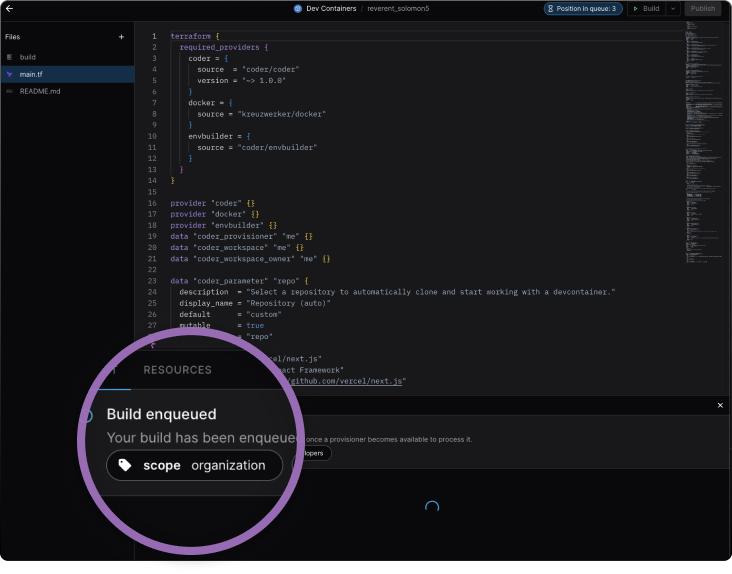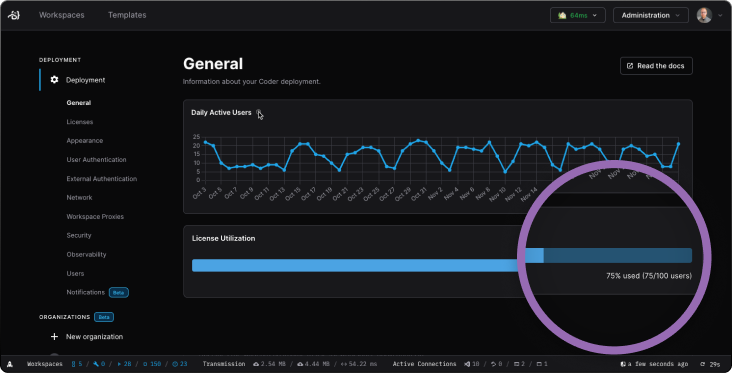We use cookies to make your experience better.
Release Recap: Multi-Org Management and Provisioning Improvements, and Free Remote Desktop Access in 2.18.0
Today’s newest mainline release is 2.18.0; check out what’s included below. At the time of this writing, our latest stable release is 2.17.2. For more details about the features in 2.17.0, see last month’s release post.
We're excited to roll out Coder 2.18.0! This month’s release delivers powerful updates to help teams scale and streamline operations. Coder Premium customers gain enhanced multi-organization management and foundational improvements to provisioning workflows, setting the stage for even bigger updates coming soon. Meanwhile, all users can now access the new Amazon Windows DCV Module for seamless, one-click remote desktop access.
Dive into the new features below, and check out the full changelog on GitHub for more details.
Technical Advisory Council Highlights
This month, we hosted another Virtual Technical Advisory Council (VTAC) session with Coder customers, focusing on feedback for in-progress features and our product roadmap. Some key areas of discussion included enhancing productivity insights, optimizing the JetBrains IDE experience, simplifying provisioning workflows, and improving workspace diagnostics.
Your feedback shapes our priorities and guides the development of impactful new features. Interested in joining a future VTAC? Reach out to your Coder Customer Success team or tag us on GitHub with your ideas.
Stay tuned for updates as we refine and release these features!
Improved Management & Control for Scaling Your Multi-Org Deployment
As teams grow and environments become more complex, scaling efficiently requires tools that minimize manual work. This month’s updates are designed to help admins streamline operations and automate repetitive tasks so they can maintain focus on higher-impact work.
Manage Multi-Org Coder Deployments with Terraform
 With the latest update to the
With the latest update to the coderd Terraform provider, you can now create and manage multi-organization Coder deployments with ease. Declaratively configure custom organization-wide roles—such as org operations, provisioner keys, and group/role sync—directly in Terraform. This ensures consistency across deployments while reducing the overhead of managing infrastructure manually.
Terraform’s infrastructure-as-code approach brings added benefits:
- Streamlines infrastructure testing
- Enforces compliance with governance policies
- Improves collaboration, enabling developers to suggest improvements through Git.
This update allows admins to spend less time on manual operations and focus on building scalable, robust systems. Ready to try it out? Explore the coderd Terraform provider on GitHub.
Manage SSO Organization Sync at Runtime
 Coder 2.18.0 introduces runtime management for SSO synchronization, eliminating the need for server redeployments—a process which could disrupt your workflow. Admins can now make changes on the fly using the Coder CLI, making the process faster and more flexible. This means:
Coder 2.18.0 introduces runtime management for SSO synchronization, eliminating the need for server redeployments—a process which could disrupt your workflow. Admins can now make changes on the fly using the Coder CLI, making the process faster and more flexible. This means:
- Simplified onboarding: Add a new organization with a single command—no planned downtime required.
- Seamless automation: Programmatically onboard new organizations via CI pipelines or API integrations.
Learn more about this update on our documentation.
Enhanced Provisioning for Multi-Org Deployments
As more organizations adopt Coder, provisioners play a critical role in onboarding clusters and managing resources across teams. This release brings important foundational improvements to how Coder handles provisioning, laying the groundwork for even bigger updates coming next month.
In Coder, external provisioners are daemons that run outside the main server to handle workspace and template setup tasks. They offload work from the server and provide better isolation, scalability, and security.
Updated Provisioner Tag Handling
 Workspace tags in Coder dynamically define workspace requirements, such as environment or runtime, ensuring jobs are routed to provisioners capable of meeting those needs. In this update, we've refined the handling of
Workspace tags in Coder dynamically define workspace requirements, such as environment or runtime, ensuring jobs are routed to provisioners capable of meeting those needs. In this update, we've refined the handling of coder_workspace_tags to deliver consistent and predictable behavior during both template imports and workspace builds. Previously, issues with tag assignments during imports could result in potential job misassignments. Administrators can now rely on uniform tag evaluations across all provisioning scenarios, reducing the need for manual interventions.
Learn how to use coder_workspace_tags to dynamically set provisioners for a template in the Coder documentation.
Improved User Feedback for Pending Template Builds
 To assist users in understanding why a template build might be stuck in a pending state, we've added clear UI warnings when no corresponding provisioner is available. This improvement helps users quickly identify and resolve provisioning issues, minimizing downtime and enhancing productivity. Later this month, we’ll also enhance the Workspaces UI to address cases where workspaces remain in a pending state.
To assist users in understanding why a template build might be stuck in a pending state, we've added clear UI warnings when no corresponding provisioner is available. This improvement helps users quickly identify and resolve provisioning issues, minimizing downtime and enhancing productivity. Later this month, we’ll also enhance the Workspaces UI to address cases where workspaces remain in a pending state.

Detection of Unsafe Data Source Usage
 We've implemented mechanisms to detect and warn against potentially unsafe usage of data sources within
We've implemented mechanisms to detect and warn against potentially unsafe usage of data sources within coder_workspace_tags. This proactive measure ensures that templates are configured securely and function as intended, preventing unforeseen errors during workspace provisioning.
Learn more about this in the Coder documentation.
Stream High Performance Remote Windows Desktop with the Amazon Windows DCV Module
 Accessing high-performance remote Windows desktops just got easier with our new Amazon DCV Module, now available in the Coder Registry. This module automates the installation and configuration of Amazon DCV, enabling seamless, one-click access to remote desktops directly from a web browser.
Accessing high-performance remote Windows desktops just got easier with our new Amazon DCV Module, now available in the Coder Registry. This module automates the installation and configuration of Amazon DCV, enabling seamless, one-click access to remote desktops directly from a web browser.
Highlights:
- Automated setup: Streamlines installation and configuration of Amazon DCV.
- Browser-based access: Securely connect to cloud-based Windows desktops in one click.
- Optimized for demanding tasks: Ideal for workflows like 3D rendering, video editing, and collaboration, even in high-latency environments.
Amazon DCV is a remote display protocol that securely delivers remote desktops and application streaming from any cloud or data center to any device globally, reducing the need for costly workstations. Unlike traditional RDP, DCV offers browser-based access to remote desktops, making it ideal for scenarios involving high-latency connections or demanding workloads such as 3D rendering, video editing, and collaborative sessions.
Check out the module in the Coder Registry to get started.
Other Updates
Improved Visibility of Daily Active Users
 To make it easier to gauge total license consumption, we’ve made more user information available in our deployment page or via API endpoint.
To make it easier to gauge total license consumption, we’ve made more user information available in our deployment page or via API endpoint.

Terraform Provider 2.0
 We’ve completed maintenance on our Terraform provider, removing deprecated properties. Version 2.0 requires Coder version 2.18.0 or later. Review these changes in our migration guide.
We’ve completed maintenance on our Terraform provider, removing deprecated properties. Version 2.0 requires Coder version 2.18.0 or later. Review these changes in our migration guide.
Bug Fixes
As always, we release bug fixes and patches throughout the month to ensure Coder continues to run smoothly. Check out our Coder releases on GitHub for full details on the latest patches. Found a bug? Tag it here to let us know!
That concludes this month’s Release Recap. We can’t wait for you to try out our new features!
Enjoy what you read?
Subscribe to our newsletter
By signing up, you agree to our Privacy Policy and Terms of service.

